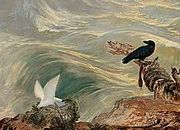| Wordsmith.org | The magic of words |
MooT - the Semantics and Etymology game
The world's toughest language game.
The world's toughest language game.
| mootgame.com | How to sponsor? |
Dec 9, 2019
This week’s themeBiblical allusions
This week’s words
corbie messenger

The Assuaging of the Waters (detail)
Art: John Martin, 1840
A.Word.A.Day
with Anu GargA language belongs to anyone who speaks it, not to a country or corporation or religion. I was reminded of this when I came across this news item (permalink). Some students in a university in India had boycotted classes because their Sanskrit professor was a Muslim. The Sanskrit language can only be taught by a Hindu, they had claimed.
Sanskrit was the language of choice for Hindu scriptures, but that has no bearing on who can study or teach the language. Did those students also boycott their English classes because the professor wasn’t a Christian?
Well, the Bible wasn’t written in English (it was originally written in Hebrew, Aramaic, and Greek. See here.), but it has influenced the language. Many Biblical allusions have become a part of the language. This week we’ll see five of them.
For even more words having origins in the Bible see here.
corbie messenger
PRONUNCIATION:
MEANING:
noun: A messenger who does not arrive or return in time.
ETYMOLOGY:
noun: From allusion to the crow that Noah had sent out from his ark. From corbin (raven), from Old French corbin, from Latin corvus (raven, crow). Earliest documented use: 1525.
NOTES:
In the Bible, after months of floating around, Noah has his ark parked on Mt. Ararat. He picks a raven from his menagerie to go scout the scene. The bird never returns. Then Noah picks a dove and the dove does dutifully return. The moral of the story?

But let’s not be too hard on the raven.
 Yes, but “forty days and forty nights” of moisture is a little too much.
Yes, but “forty days and forty nights” of moisture is a little too much.

But let’s not be too hard on the raven.

 Yes, but “forty days and forty nights” of moisture is a little too much.
Yes, but “forty days and forty nights” of moisture is a little too much.
USAGE:
“I will be no corbie-messenger in mine old age -- your message to your son shall be done as truly by me as if it concerned another man’s neck.”
Walter Scott; The Abbott; Archibald Constable and John Ballantyne; 1820.
Walter Scott; The Abbott; Archibald Constable and John Ballantyne; 1820.
A THOUGHT FOR TODAY:
I cannot praise a fugitive and cloistered virtue, unexercised and unbreathed, that never sallies out and sees her adversary, but slinks out of the race where that immortal garland is to be run for, not without dust and heat. -John Milton, poet (9 Dec 1608-1674)
Got a comment? Click here to share it.
Or you can email us at words@wordsmith.org
Unsubscribe | Subscribe | Update address | Gift subscription | Contact us
© 1994-2019 Wordsmith.org
Or you can email us at words@wordsmith.org
Unsubscribe | Subscribe | Update address | Gift subscription | Contact us
© 1994-2019 Wordsmith.org

No comments:
Post a Comment